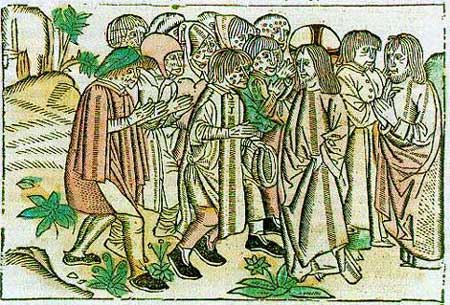|










|
|
The ten lepers, Luke 17, 11-19
On his way to Jerusalem, Jesus went through Samaria and
Galilee. Entering a village, ten lepers met Jesus and Luke noticed
they were all men. For the Jews, leprosy had a close link to
sin.
Leprosy is the unique identification of these men; the
shameful sickness has transformed their social status. They are
condemned to live outside, "out of the city" according
to the Leviticus.
United in the sickness, they are also united in the request that
they addressed to Jesus and the way they qualified him: "Jesus,
Master" not a person who teaches but a person who "presides
over". They were looking for some one who could cure the
sickness; they were not looking to be taught.
 |
Jesus surprises us by his answer " Go and show
yourselves to the priests" Moses mentioned the case
in the Leviticus (14, 1-32). Everybody would think that he meant
the Jewish priests of Jerusalem, but one of the ten lepers, the
Samaritan, will be going to the temple of Mount Garizim, with
its own priests who are the rivals of the Jews.
Were the priests medicine men? No, they were just acknowledging
that the symptoms of the disease had disappeared then they propose
a long ritual of purifications and expiations, a marabou from
Africa or from a cosmopolitan city will be at ease with this
sort of things. After eight days they will be reintegrated into
the community and ready to go to the Temple for the sacrifice
of the Holocaust and the official thanksgiving.
|
The lepers perhaps expected an immediate and spectacular healing.
Nothing happened but they trusted any way this itinerant prophet
who is asking an easy thing to do. Jesus "presides over"
their entering into the faith. |

|
Then the wish of these men was fulfilled. On the way back,
discretely, away from the crowd of onlookers, Jesus' compassion
showed up, they were all "purified" to use a
religious term for this healing event. Nine of them still went
on to accomplish what the Master said. Can we blame them? Used
to the letter of the Law, they were immerged in a religion of
"commands", their feelings and initiatives seemed to
be barred by a Law that molds and constrains. The religion of
"you must do or not do" But where is the relationship
with the commandment "you shall love"? The link
to love is fundamental for those who have to take initiatives
in front of unexpected situations.
For the Samaritan, religion had not taken away from him
the human feeling. First he looked at the reality, and he named
it: "healed" " knowing he was healed".
For him, illness is not related to religion but is the business
of the medical doctors. Unfortunately in those times medicine
could not do any thing for him. The one who healed him was a
man, a man of an unknown power who seems to "preside over"
life and death. As it is polite to thank a benefactor, the man
spontaneously came back to Jesus in glorifying God. No need for
him to go to the Temple, God is everywhere and mostly he is in
this man, " a force went out of him and healed them all
" (Luke 6,19)." He fell down at Jesus' feet,
giving him thanks"
And Jesus had this disturbing question: "Where are
the nine? What kind of religion had they these nine men? It did
not make them more human in their conscience and their social
life. Where was their freedom of thinking, their freedom of expressing
joy for recovering a healthy life? The definitive words are pronounced
to the Samaritan " saved", your faith had
saved you!" (thy faith hath made thee whole). He was
purified, healed, saved. |
